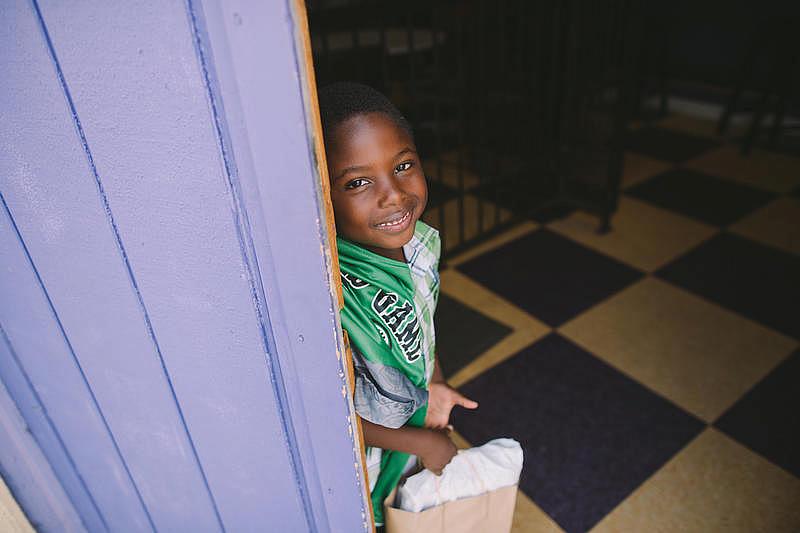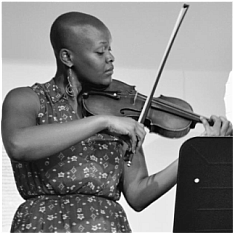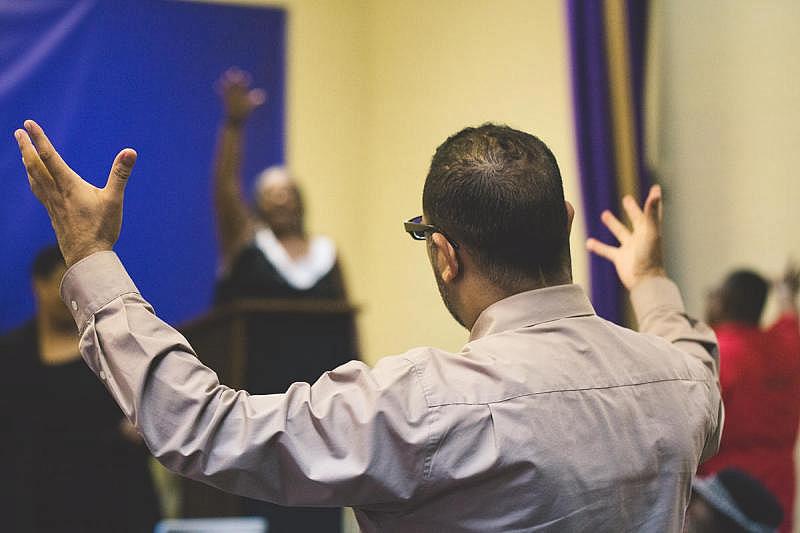Dismantling the stigma around black mental health
This report was produced by KALW reporter Leila Day for the California Health Journalism Fellowship, a program of the USC Annenberg School for Communication and Journalism. The three-part series looks at stigmas toward health care amongst African Americans; why there aren't more African American therapists and the possible effects; and mental health care among Africans living in the Bay Area.
Other pieces in the series include:

A young church-goer at New Revelations Church in Oakland.
Violinist Danielle Taylor is tall, in her late 20s, with a shaved head and a beanie cap propped to the side. She smiles a lot and upon meeting her for the first time, my instinct is to give her a hug instead of a handshake. When she picks up her violin for an impromptu song, she shifts into a deep calm.
Everything feels serene in her Berkeley living room: the flowers are in bloom, the sun is shining bright outside. Taylor is in a calm place, with her life and with her music. But it took her a while to here.
“I grew up in Sobrante Park in East Oakland,” she tells me. “Definitely a poor, working-class neighborhood.” Sobrante Park is about 15 miles from where she lives now.
“Growing up in Sobrante, a lot of people have learned to navigate the world," she says, "and be functional carrying a lot of weight that I think would be useful to talk about ... People in my family and community.”
This weight that Taylor’s talking about is something she’s felt since she was a young girl. She says her family was tight-knit, but her neighborhood was mostly lower-income and had high crime. A scholarship sent her from her mostly black public school to a mostly white one.
Diversion participation numbers as of July 2021.
Taylor remembers feeling completely isolated and praying for things to change. Then, as she got older, she experienced a trauma that she doesn’t like to talk about.
“Maybe I thought with being black and dealing with things you are stronger or have to be stronger -- or you pray about it,” she laughs.
But for a long time, praying didn’t work for her. She tried to keep hustling. As an adult, she went from fits of crying, to not crying at all. She stopped dreaming at night. She wanted to try and stay strong for her daughter, but she felt completely disjointed. By 2014, she knew she needed help. She didn’t tell her family. "Depression" was a word that she didn’t grow up around.
“I grew understanding ... depression was something that white people experienced when they didn’t have enough whatever white people don’t get enough of,” she says. “And whenever you had a problem it was because you had a lack of faith and praying and going to church could fix everything.”
A persistent stigma
A 2011 report from the Centers for Disease Control found that even though African-Americans are more likely to report major depression, only around 7% actually sought treatment -- that’s compared to 13.6% of the general population.
Dr. Loma Flowers, a clinical professor of psychology at the University of California in San Francisco, says much of this has to do with history. “I think in general poor people have not been the allowed the luxury of mental illness,” she says. “They don’t have time, they don’t have the money.”
The stigma that kept Danielle Taylor from sharing her depression with her family doesn’t come out of nowhere.
“It’s a disease of the rich -- you can afford to be depressed and not get out of bed,” says Flowers. Historically, she adds, for black people in America, “getting out of bed was not an option.”
Flowers says over her 40 years in practice, she’s seen an unspoken acceptance of mental illness -- a willingness to tolerate what was considered unusual behavior, but not necessarily to talk about why.
“It was not uncommon to include people, they would be seen as crazy: ‘She’s crazy, talking to the TV.’ It’s a mixed thing. It’s like the stigma about being gay."
"There was a double-think about it in the black community, people would make the jokes and do the deriding and insulting at the same time they would also accept the person who was gay when everyone knew -- it’s the same open secret with mental illness,” Flowers explains.
Opening the church doors
Churches have long been the place where many African-Americans find community and support, and some churches are recognizing that it’s not just faith that people can lean on when having a mental health crisis.
On a Sunday morning in Oakland, about 30 people gather at the temporary home of the New Revelation Community Church -- it’s in the back room of the Omega House fraternity club, just past the bar.
Reverend Donna Allen’s sermon has the crowd clapping and shouting “Amen.”
“Today Jesus would be in the Black Lives Matter protest! Jesus would be screaming, ‘Take the confederate flag down!’” she tells the crowd.

“I think it helps, especially if I don’t have stigmas and I don’t have issues with someone having a mental health condition,” she says. “That next step is connecting them with resources, and following up with them, encouraging them.”
She’s led two mental health trainings for members of her church with funding from Alameda County, which has millions of dollars in mental health care programs. It means the trainings are free.
“The hope is that by experiencing some things that they experience in the workshop, by having some of the interactions they will be less likely to ignore, less likely to walk away, to minimize,” says Allen.
The county has a massive effort underway to train community organizations across ethnic groups in screening for mental health issues. It includes providing resources for those who may need professional help, trainings with the Oakland police department, and workshops in churches. So far Reverend Allen has trained over 20 people to look out for mental health crises.
Other options
Even with all of the training in the world, a helper from the church wasn’t going to be right for violinist Danielle Taylor.
“I wanted someone skilled to help me find different ways of looking at [my depression],” she says. “Is there a pattern? I want to know why and I can’t get that in a prayer.”
She began looking for therapists.
“My other option was to not deal with it anymore. It wasn’t covered by my insurance.”
This is another hurdle that many African-Americans face. In 2014, health care reform made mental health care an essential benefit for even the most basic coverage. But they level of care depends on the type of insurance. Taylor’s initial visits were to Highland Hospital, a public general hospital in Oakland. She says the experience wasn’t what she was hoping for.
“It was someone who wasn’t licensed, working toward her license and I felt I wasn’t getting enough from it,” she says.
Highland’s patients are mostly lower-income, and have major health care disparities that are related to living in poverty, something that has been directly linked to poor mental health.
“Who’s going to pay?” asks Dr. Flowers. “That's your bottom line, who is going to pay the bill because that somebody is paying the bill for the private practice therapy. That's really what it boils down to.”
Finding balance
Danielle Taylor decided to pay out of pocket to get the care she wants, and she says the therapy is worth it. She reached out to the parents of her violin students to see if they could recommend therapists who took one-on-one clients and could meet her budget. It didn’t take long before she found someone who had a flexible payment plan.
Today, Taylor says she’s in a good place. She goes to therapy once a week. She’s found some balance between the trauma that plagued her for years and an outlet that gives her the space to work it out, with a plan she can work on after her visits.
“It gives me something that I can work on,” she says of therapy. “Sometimes when you pray you don’t get a response of, this is what you can work on this week until I see you next week. Always thinking about things, working on things and generally feeling better -- you feel better!” she laughs.
But there are still some things that she holds back on. Taylor hasn’t told her entire family that she’s in therapy.
“I don’t feel the need to tell my older family members,” she says. “I think that they would have some criticism. I don’t think it’d be whole-hearted support.”
So, for now when it comes to looking inward, Taylor confides in the person who she feels can help her most: her therapist.
[Below is the audio version of the story.]
This story was originally broadcast by KALW.

